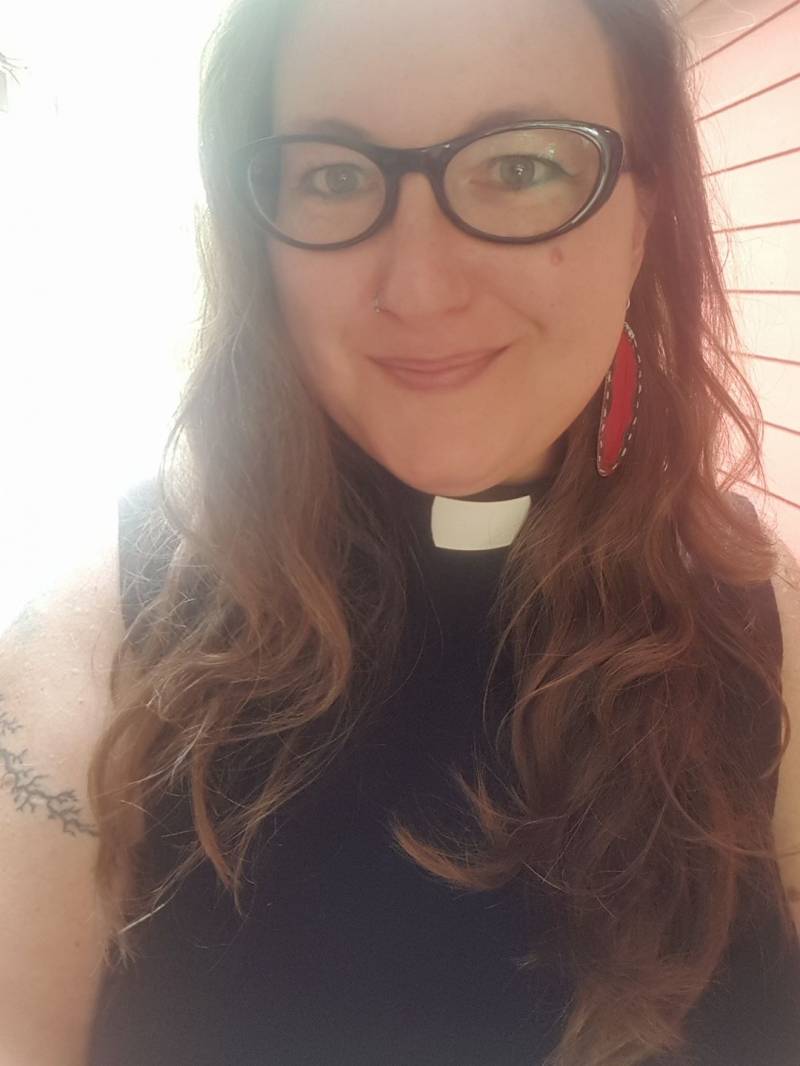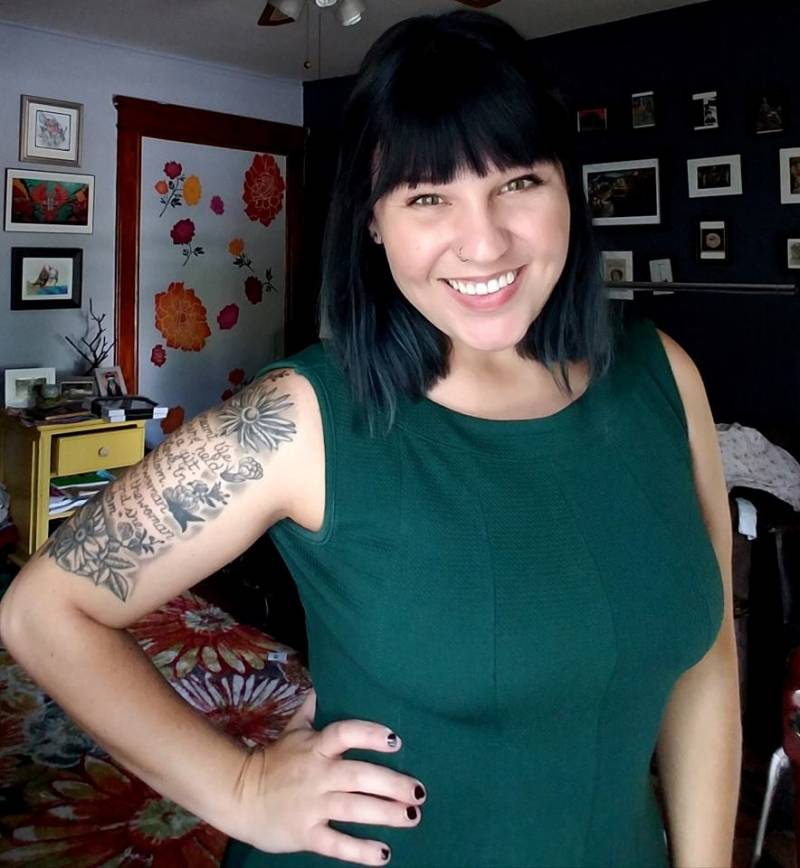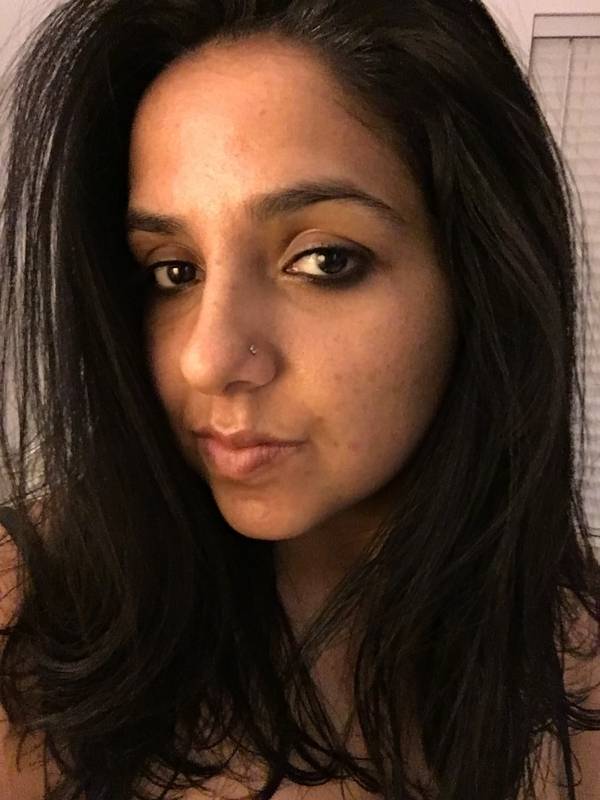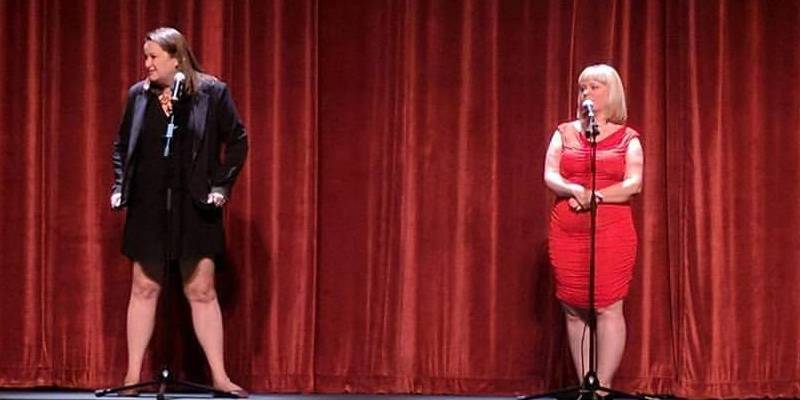Molly McLay is a social worker and the assistant director of the Women’s Resources Center. Her focus is on gender-based violence prevention efforts, particularly sexual assault. Given that plus an academic background in English, writing, and women’s studies, it seems she is positioned perfectly to be the co-organizer of tonight’s performance of The Vagina Monologues, C-U’s own version of the groundbreaking play by Eve Ensler. She and fellow organizer January Boten have assembled a gender inclusive and diverse cast of almost 70 performers that will take to the stage at The Virginia Theatre this evening to share monologues that highlight the experience of women and their bodies: stories about sexuality, violence, and body image told with honesty and humor. It’s fitting that this will be a benefit for Courage Connection, an organization that provides vital services for women dealing with domestic violence. Last week I had the opportunity to chat with Ms. McLay about the production: how it came together, what sort of impact she hopes to have, and what makes this particular performance unique.
Smile Politely: What inspired this particular production?
Molly McLay: Annually, the U of I has done a production of the Vagina Monologues, and this year there wasn’t one. January and I have both been involved in productions in the past, and January was involved at a different university where the structure involved a lot of people with a low time commitment, and they were able to raise a lot of money. Typically these productions give to a local center, and Courage Connection has been a beneficiary in the past. I did some crowd sourcing a while ago to find out who might be interested in doing this, and a number of community members were. Fast forward to May when Courage Connection was in dire straits, and January and I decided it was the prime time to do this.
SP: How did you select participants for the performance?
McLay: We made a strategic decision to have an all inclusive production, which means a couple of different things. We intended to cast everyone who auditioned. We realize there are people who have an important voice to share whether someone is a professional actor or has never acted in their lives. January and I both know a lot of people, so we ended up with a cast of close to 70. We also wanted to make this inclusive in terms of identity. We realize that the Vagina Monologues is such an important feminist work, but that there are limitations. The conflation of “woman” and “vagina” is not inclusive to trans women and non-binary individuals. So we really wanted to make sure that anyone who felt compelled to the material we would want in the production. We have performers who are trans and non-binary, we have a number of monologues about women of color and trans women, and we have women of color and trans individuals delivering them.
SP: Obviously the fact that this production includes people from our own community makes it unique. This show has been done thousands of times, what else makes this one stand out?
McLay: To my knowledge, this is the biggest production (of the Vagina Monologues) that we’ve ever had in the community. Having it at the Virginia Theatre was strategic. It’s huge, historic, and January had a vision of having it here from the beginning. Because of the number of people in the cast, it’s likely that if you live in this town you know someone who’s in the production. We’ve got people of many different ages: from college students to people in their fifties and sixties…it’s been a way for people to build community around this topic, and I think you’ll see that if you attend. We hope the audience members recognize, “I could do this too.”
SP: What do you hope people take away from the performance?
McLay: I think there are probably people who would say we don’t really need the Vagina Monologues any more. And I think that’s not really true. As evidenced by our political climate, it’s clear that sexism still exists, that even public officials believe that they can commit sexual violence with no repercussions, and that a “vagina” is still a taboo topic. It’s a word people still shudder around. The violence that someone with a vagina might experience and also the pleasure that someone might experience…both of these things we still can’t really talk about to the degree that we need to. This is about giving voice to the stories that may lead someone to raise an eyebrow, but we want to make not stigmatized anymore and to be able to do that in a huge setting with a vast number of people. We hope seeing such a diverse group of people sharing this message would hit home for people.
As Ms. McLay mentioned, with close to 70 performers from the community in the show, there’s bound to be someone you know taking the bold step of getting up on stage to talk openly and and candidly about a topic that still makes people blush. If you check out their Facebook event page, you’ll be introduced to several of the cast members. Here are just a few:

Rev. Leah Roberts-Mosser: wife, mom, pastor of Community United Church of Christ
“The arts are a transformative thing. When we participate in the arts, as artists or observers, whether that’s going to a gallery, a concert, or a theater production like this one, we are changed in some way. In the case of this theater production, we all get to hear stories that don’t get told often. I think those are always the most important stories to hear: the ones we aren’t hearing now. I think it’s particularly important for me, as a clergy person, to speak these stories into reality. Christianity has done the lion’s share of shaming when it comes to women’s bodies, sex, intimacy, violence against women, women’s worth, sexual identity, and sexual orientation. For me, participating in this production as a clergy person and as a woman means I get to stand up and say, unequivocally, that there should be no shame in telling these stories and occupying the world in your a woman’s body, be that your cis-gender or trans woman’s body. So, in short, I love, love, love The Vagina Monologues and am thrilled to be able to help Courage Connection. What would our community be without that essential resource?”

Hope Holland: grad student in Community and Clinical Psychology at the University of Illinois
“My research in grad school focuses on gender-based violence, and I’m currently finishing up a pilot study on women’s experiences of ‘cat-calling’ and other public harassments. Perhaps more salient to my decision to participate in this show, though, is that I’ve had similar experiences to many women in that I’ve also been the victim of a partner’s violence. For me, leaving was relatively easy, I had an amazing support system here in Chambana, and my ex-partner did not retaliate- All of that makes me incredibly lucky. Statistically women are at heightened risk for violence in the time after they attempt to leave an abusive partner, and the often months or years of her often coerced isolation can make it seem that she doesn’t have anywhere to go for support. This makes the work that Courage Connection does in our community vital. This show has been such a positive experience for me. Seeing so many genuine, incredibly unique women and femmes donate their time and talents to fundraising for Courage Connection is something I’m going to carry with me for a long time.”

Diya Tahiliani: developer at Wolfram Research, feminist, and Women’s March organizer
Just another feminist trying to remove the Voldemort effect from the word “vagina”, one monologue at a time. I’ve never been one to shy away from being top banana in the shock department, especially when it comes to intersectional feminism.
Courage Connection provides a vital service to the wellness and safety of our community; supporting this cause was a no brainer. No one deserves to feel unsafe in their home or partnerships and while it’s easy to speak anecdotally about violence, more often the stories are hushed and victims are made to feel ashamed. These stories are important. These stories need to be heard.
The Vagina Monologues provides a voice and brings humanity to women/non-binary human beings who have been marginalized, silenced, ignored or are simply too afraid to speak up. It addresses a variety of issues which are unavoidable in today’s society with respect to the way that women are brought up and taught to think about their bodies, value, and self-worth. The monologues are funny, they will make you cry, but most importantly they will challenge your thinking.
Don’t have tickets yet? There’s still time! The show begins at 7:30 p.m., and there are still tickets available online and by calling the Virginia Theatre Box Office. There are three prices levels ranging from $9.50-22.50, and a portion of your ticket purchase will support the vital work of Courage Connection. If you want to get more involved in the conversation, there will be a Q&A at Seven Saints following the performance.








